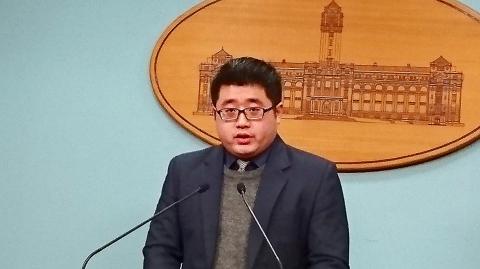The Presidential Office yesterday said it was not consulted before the preparatory committee for the National Congress on Judicial Reform decided to drastically reduce the number of Supreme Court judges and give the president the power to appoint judges without legislative approval.
“President Tsai [Ing-wen (蔡英文)] has always supported judicial independence. Her resolve and stated position on this matter need not be questioned,” Presidential Office spokesman Sidney Lin (林鶴明) said.
Tsai serves as the convener of the committee and there are five sub-committees.

Photo: Chung Lee-hua, Taipei Times
“Members of the preparatory sub-committees have been meeting to deliberate on the thematic issues assigned to each of them,” Lin said, adding that the issues were compiled during an open call for input by various sectors of society and then consolidated by committee members.
“As such, we respect each committee member’s judgement and have given them room for discussion to allow them to fully express their views and ideas,” he said.
As for the process of appointing judges to the Supreme Court and the Supreme Administrative Court, members of the judicial reform committee did not make consultation, nor did they seek the Presidential Office’s opinion, Lin said.
“The president believes that issues related to presidential powers and mandated duties should be treated carefully, in a prudent way,” Lin said, adding that the issue would be further evaluated in the final committee session.
During a meeting of the committee on Monday a consensus was reached that the top level of the judiciary should be reduced by cutting the combined number of Supreme Court and Supreme Administrative Court judges from 94 to 21, and granting the president the power to make final selection of the judges without going through legislative approval.
At present, the Judicial Yuan nominates and appoints top-level judges.
Under the proposal, the Judicial Yuan president would nominate 63 candidates — three times the required number of judges — and a screening committee would then narrow the list to 42 and the president would select candidates from the shortlist.
Critics and opposition party lawmakers have accused Tsai of seeking to expand her powers and interfere with judiciary’s independence.
However, the Judicial Yuan on Tuesday said that the proposal aims to bring the nation more in-sync with the judicial systems in other countries.
Reached for a comment yesterday, former president Ma Ying-jeou (馬英九) urged his successor to be cautious in handling the issue, saying that Taiwan should not randomly copy foreign systems.
Additional reporting by CNA

The manufacture of the remaining 28 M1A2T Abrams tanks Taiwan purchased from the US has recently been completed, and they are expected to be delivered within the next one to two months, a source said yesterday. The Ministry of National Defense is arranging cargo ships to transport the tanks to Taiwan as soon as possible, said the source, who is familiar with the matter. The estimated arrival time ranges from late this month to early next month, the source said. The 28 Abrams tanks make up the third and final batch of a total of 108 tanks, valued at about NT$40.5 billion

A group from the Taiwanese Designers in Australia association yesterday represented Taiwan at the Midsumma Pride March in Melbourne. The march, held in the St. Kilda suburb, is the city’s largest LGBTQIA+ parade and the flagship event of the annual Midsumma Festival. It attracted more than 45,000 spectators who supported the 400 groups and 10,000 marchers that participated this year, the association said. Taiwanese Designers said they organized a team to march for Taiwan this year, joining politicians, government agencies, professionals and community organizations in showing support for LGBTQIA+ people and diverse communities. As the first country in Asia to legalize same-sex

Travel agencies in Taiwan are working to secure alternative flights for travelers bound for New Zealand for the Lunar New Year holiday, as Air New Zealand workers are set to strike next week. The airline said that it has confirmed that the planned industrial action by its international wide-body cabin crew would go ahead on Thursday and Friday next week. While the Auckland-based carrier pledged to take reasonable measures to mitigate the impact of the workers’ strike, an Air New Zealand flight arriving at Taipei from Auckland on Thursday and another flight departing from Taipei for Auckland on Saturday would have to

MOTIVES QUESTIONED The PLA considers Xi’s policies toward Taiwan to be driven by personal considerations rather than military assessment, the Epoch Times reports Chinese President Xi Jinping’s (習近平) latest purge of the Chinese People’s Liberation Army (PLA) leadership might have been prompted by the military’s opposition to plans of invading Taiwan, the Epoch Times said. The Chinese military opposes waging war against Taiwan by a large consensus, putting it at odds with Xi’s vision, the Falun Gong-affiliated daily said in a report on Thursday, citing anonymous sources with insight into the PLA’s inner workings. The opposition is not the opinion of a few generals, but a widely shared view among the PLA cadre, the Epoch Times cited them as saying. “Chinese forces know full well that